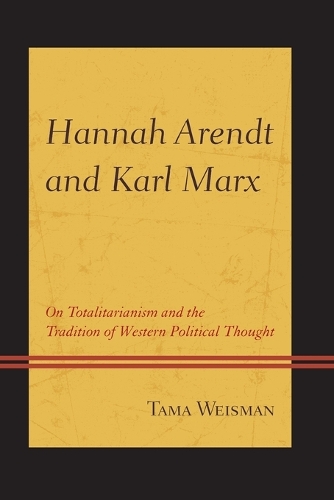
Hannah Arendt and Karl Marx: On Totalitarianism and the Tradition of Western Political Thought
(Paperback)
Publishing Details
Hannah Arendt and Karl Marx: On Totalitarianism and the Tradition of Western Political Thought
By (Author) Tama Weisman
Bloomsbury Publishing PLC
Lexington Books
24th August 2015
United States
Classifications
Professional and Scholarly
Non Fiction
Political science and theory
320.53
Physical Properties
Paperback
188
Width 160mm, Height 232mm, Spine 14mm
299g
Description
Hannah Arendt and Karl Marx: On Totalitarianism and the Tradition of Western Political Thought is the first book to examine Hannah Arendts unpublished writings on Marx in their totality and as the unified project Arendt originally intended. In 1952, after the publication of The Origins of Totalitarianism, Hannah Arendt began work on the project Totalitarian Elements in Marxism. First conceived of as a companion to The Origins of Totalitarianism, Arendt neither completed this project, nor its subsequent revision, Marx and the Tradition of Western Political Thought. Filling in many of the gaps in our understanding of the trajectory of Arendts thought from the time she published Origins in 1948 to the publication of The Human Condition in 1958, Tama Weisman traces and evaluates the development of Arendts thought on Marx, how his thought could be used toward totalitarian ends, and his place in the tradition of Western political thought. Although highly critical of much of Arendts reading of Marx, Hannah Arendt and Karl Marx advances a persuasive critique of Marx implied but never developed in Arendts Marx project. Drawing on several of Arendts more persuasive criticisms of Marx in combination with her evaluation of the tradition of Western political thought, Weisman makes a compelling case for the charge that when Marx left philosophy to change the world, he paved the way for the loss of our sense of awe and wonder in philosophical, political, and worldly experience.
Reviews
Tama Weismans book is the long awaited analysis of Arendt and Marx. It carefully explains Arendts ambivalent relationship to Marxs work and how Arendt's lesser known and never finished project on Marxs work led to the development of some of her key political ideas. Weisman convincingly argues that despite Arendts misunderstanding of aspects of Marxs thought, Arendts analysis of Marx helped her critique the political conditions that led to totalitarianism. It is a must for anyone interested in Arendts work. -- Karin Fry, University of Wisconsin, Stevens Point
Hannah Arendt and Karl Marx combines archival scholarship and philosophical inquiry to provide a comprehensive exploration of Arendts own changing positions in regard to her subject. While making clear that Arendt misread Marx on key points, Weisman convincingly demonstrates how Arendts appreciation of his philosophical significance and troublesome originality led to her analysis of ancient Greece and the political values of the democratic polis, and further to her investigations into urgent questions of violence and revolution, and the relations between philosophy, thinking, and politics. Arendts deeply ambivalent engagement with Marx has long challenged scholars. This book will inform scholarship from now on, while illuminating the real contribution of Arendts resurrection of a tradition of 'the political' in the modern world. -- Norma Claire Moruzzi, University of Illinois at Chicago
Author Bio
Tama Weisman is associate professor in the Department of Philosophy at Dominican University in River Forest, Illinois.
